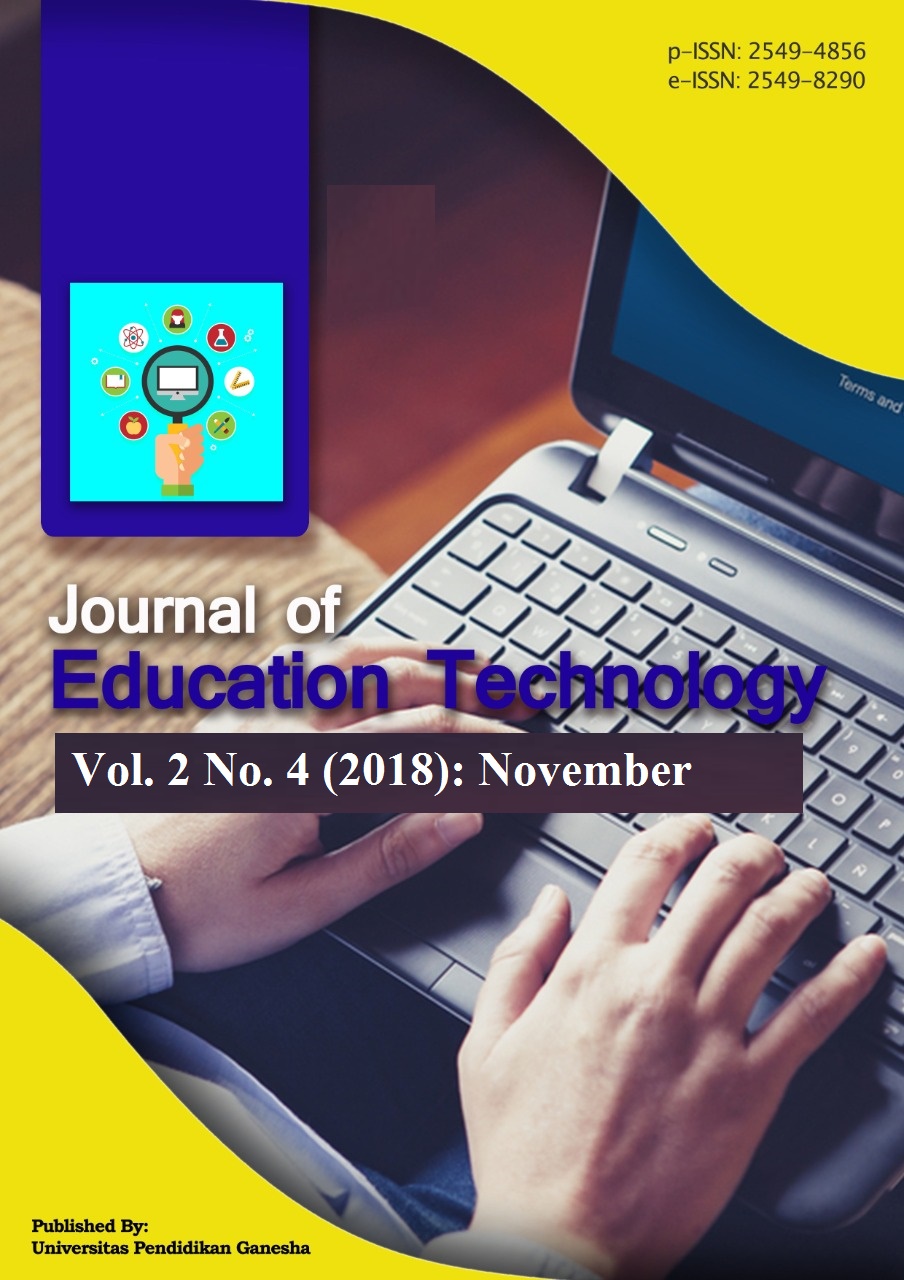PENGARUH PENDEKATAN FLIPPED CLASSROOM TERHADAP PEMAHAMAN KONSEP MATEMATIKA SISWA SMA
DOI:
https://doi.org/10.23887/jet.v2i4.17855Keywords:
flipped classroom, pemahaman konsep, pembelajaran konvensionalAbstract
Penelitian ini bertujuan untuk mengetahui apakah pemahaman konsep matematika siswa yang mengikuti pembelajaran dengan pendekatan flipped classroom lebih tinggi daripada pemahaman konsep matematika siswa yang mengikuti pembelajaran konvensional. Jenis penelitian yang digunakan adalah eksperimen semu dengan desain penelitian post-test only control group. Populasi dalam penelitian ini adalah seluruh siswa kelas X MIPA SMA Negeri 4 Singaraja tahun ajaran 2017/2018. Pengambilan sampel dilakukan dengan teknik cluster random sampling untuk memperoleh 2 kelas sebagai sampel penelitian. Data dikumpulkan melalui tes pemahaman konsep matematika yang diberikan kepada siswa dalam bentuk tes uraian yang diberikan diakhir penelitian. Dari data post-test diperoleh rata-rata skor pemahaman konsep matematika siswa yang dibelajarkan dengan pendekatan flipped classroom adalah 15,265 dan rata-rata skor pemahaman konsep matematika yang mengikuti pembelajaran konvensional adalah 13,688. Dari hasil analisis data menggunakan uji-t satu ekor dengan taraf signifikansi 5% menunjukan bahwa . Hal ini berarti pemahaman konsep matematika siswa yang mengikuti pembelajaran dengan pendekatan flipped classroom lebih tinggi daripada pemahaman konsep matematika siswa yang mengikuti pembelajaran konvensional. Dengan kata lain pendekatan flipped classroom berpengaruh positif terhadap pemahaman konsep matematika siswa.
References
Alifia, Nugrahaning N. (2017). “Analisis Deskriptif Soal Ujian Nasional Matematika SMA Program IPA Tahun Ajaran 2015/2016 Ditinjau dari Apsek Kognitif TIMSS”. Naskah publikasi Universitas Muhamadiyah Surakarta. Retrieved from https://eprints.ums.ac.id/ 49999/13/Naskah%Publikasi.pdf.
Drake, Lynne dkk. (2016). “A 2020 Vision For Public Education in Ultster Country : The Flipped Classroom, An Approach to Teaching and Learning”. Retrieved from http://www.newpaltz.edu/benja mincenter/2020.html.
Jacob, Enfiel. (2013). “Looking at the Impact of the Flipped Classroom Model of Instruction on Undergraduate Multi-media Student at CSUN”. Teach-Trend, 57(6), 14-18. Retrieved from https://link.springer.com/article/10.1007/s11528-013-0698-1
Lokadata. (2017). Nilai Rata-Rata Ujian Nasional Matematika Tingkat SMA. Retrieved from https://lokadata.beritagar.id/chart/preview/nilai-rata-rata-ujian-nasional-matematika-tingkat-sma-1509004681.
Mahayukti, G. A, dkk. (2015). Kontribusi Kecerdasan Spasial dan Kemandirian belajar Terhadap Pemahaman Konsep Matematika Siswa SMA Negeri di Kecamatan Buleleng. Prosceedings Seminar Nasional FMIPA UNDIKSHA V.
Maulipaksi, Desliana. (2017). “Siswa Bisa Pilih Mata Pelajaran Jurusan di UN, Ini Alasannya”. Retrieved from https://www.kemendikbud.go.id/2017/01/siswa-bisa-pilih-mata-pelaja ran-jurusan-di-un-ini-alasannya.
NCTM. 2000a. Principles and Standards for School Mathematics. USA : LCC.
NCTM.2000b. Mathematics Assessment : A Practical Handbook for Grade 6 – 8. USA : LCC.
Peraturan Menteri Pendidikan dan Kebudayaan No. 22 Tahun 2016 Tentang Standar Proses Pendidikan Dasar dan Menengah.
Peraturan Menteri Pendidikan dan Kebudayaan No. 59 Tahun 2014 Tentang Kurikulum 2013 Sekolah Menengah Atas/Madrasah Aliyah.
Prahara, Haris. (2017). Pada 2020, Tak Ada Lagi Pelajaran Matematika di Negara Ini. Retrieved from http://edukasi.kompas.com/read/2017/09/19/13445611/pada-2020-tak-ada-lagi-pelajaran-matematika-di-negara-ini.
Pratista, I G. N. Y, dkk. (2017). Efektivitas Media Pembelajaran E-Learning Berbasis Quipper School Terhadap Pemahaman Konsep Matematika Siswa Kelas X Di SMA Laboratorium Undiksha. Jurnal Pendidikan Matematika, 8(2). Retrieved from https://ejournal.undiksha.ac.id/index.php/JJPM/article/view/13087.
Purwanti, Rahmadani D.,dkk. (2016).”Pengaruh Pembelajaran Berbantuan Geogebra Terhadap Pemahaman Konsep Matematis Ditinjau dari Gaya Kognitif”. Retrieved from http://ejournal.radenintan.ac.id/index.php/al-jabar/article/view/131/121.
Samsidim, I W. Dipta, dkk. (2014). Pengaruh Model pembelajaran Generatif Berbantuan ICT terhadap Pemahaman Konsep Matematika Siswa Kelas X Mipa SMA Negeri 4 Singaraja. Jurnal Pendidikan Matematika, 2(1).
Sun, Jerry T.Y dan Yu-Ting Wu. (2016). Analysis of Learning Achievement and Teacher-Student Interactions in Flipped and Conventional Classrooms. International Review of Research in Open and Distributed Learning, 17(1), 79-99. Retrieved from https://files.eric.ed.gov/fulltext/EJ1090880.pdf.
Turan, Z. & Goktas Y. (2016). The Flipped Classroom: Instructional Efficency and Impact of Achievement and Cognitive Load Levels. Journal of e-Learning and Knowledge Society, 12(4), 51-62. Retrieved from https://www.researchgate.net/publication/3086943 33_The_flipped_classroom_Instructional_efficiency_and_impact_on_achievement_and_cognitive_load_levels.
Uzunboylu, H. dan Damla K. (2015). Flipped Classroom: A Review of Recent Literature. World Journal on Educational Technology, 7(2), 142-147. Retrieved from https://doaj.org/article/10bbf021a8b94208b450ce0b92cf3528.
Downloads
Published
How to Cite
Issue
Section
License
Authors who publish with the Journal of Education Technology agree to the following terms:
- Authors retain copyright and grant the journal the right of first publication with the work simultaneously licensed under a Creative Commons Attribution License (CC BY-SA 4.0) that allows others to share the work with an acknowledgment of the work's authorship and initial publication in this journal.
- Authors are able to enter into separate, additional contractual arrangements for the non-exclusive distribution of the journal's published version of the work (e.g., post it to an institutional repository or publish it in a book), with an acknowledgment of its initial publication in this journal.
- Authors are permitted and encouraged to post their work online (e.g., in institutional repositories or on their website) prior to and during the submission process, as it can lead to productive exchanges, as well as earlier and greater citation of published work. (See The Effect of Open Access)
















